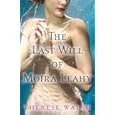In order to target agents, I choose my reading material based on the acknowledgement page.
Not enough hours in the day to do all that needs doing, so I pick up novels that tell me who thought the words were of such quality that the manuscript was one worth representing.
With my latest venture, I think I may have figured out why Elizabeth Weed never responds to my queries. It also has me wondering if my problem lies in the way that I write and what I think is worth reading.
Clearly, we're not resonating.
The flap copy of Therese Walsh's The Last Will of Moira Leahy promises a debut novel about sisterhood. That's classic fodder for women's fiction, upmarket no doubt as that's what Ms. Weed is after.
Authors know that they have to hook the reader's interest straight off, and Ms. Walsh opens with her narrator telling us all that she lost her twin. How in the world did she lose the girl, you the reader asks. I've got to turn the page to find out.
Turn that page and you'll find lots of dialogue. Line after line of dialogue. I'm not particularly chatty, but I understand that conversations can be used to move things along. In fact, dialogue moves the narrative quite a bit faster than internal dialogue and descriptions, so the second and third pages fly by.
Another tease presented itself. The narrator seemed to be hallucinating, imagining that the child she was talking to bore a marked resemblance to her sister as a child.
Keep turning the pages, and there's more.....more dialogue. Do people really talk so much and say so little?
From a first person narrative, the second chapter switches to third person and goes back in time. I find that I have to turn back, since I can't seem to remember the name of the surviving twin, and with that, my interest in the book begins to wane.
I plow on, through all the "As you know, Bob" moments that I skim over to save time. Authors know that they should research facts, even in a novel, but they shouldn't dump all that info. Yet Elizabeth Weed was untroubled by this violation of story-telling etiquette.
Often, agents ask for the first fifty pages as a sample of the writing, so I struggled through fifty pages before I gave up.
Just in case, I thumbed through the remainder, looking for a page that wasn't heavily peppered with quotation marks. Talk, talk, and more talk. I lost track of who the characters were, what role they played, and which one was supposed to provide the romantic element. I lost the thread of the story, but I don't think I ever really had a grasp of it to begin with.
Whatever Ms. Weed found in the manuscript, I don't see the attraction. Was she swayed by the author's website? The author's degree in psychology and residence in New York? As a reader, I look for a good story, an engaging tale that I can get lost in and escape from the pressing concerns of the day. Is this not what literary agents think will sell?
What matters is that Elizabeth Weed thought this sort of thing would sell, hence she would take a pass on my manuscripts. Colm Toibin's The Master wouldn't have stood a chance with her.

No comments:
Post a Comment